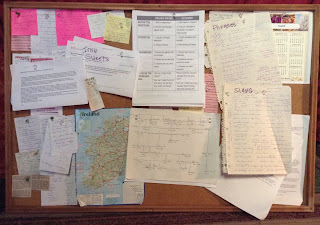Uriah Heep, Pippi Longstocking, Ichabod Crane, Ebenezer
Scrooge, Holly Golightly, Huckleberry Finn, and Katniss and Primrose Everdeen. Who
can ever forget character names that sing
in the classic stories and films we all love?
No doubt the authors who created them set out to tweak memorable impressions
of the characters they named, as well as the titles of their books. Would their
novels be less memorable…or less successful with more pedestrian names and
titles? Is there a psychology involved in these choices? Do supporting characters need pedestrian names to make the main characters more memorable? Villain
names can swing either way.
I spend an inordinate amount of time choosing character
names and book titles. My character list was long for book three in my
Accidental Series--The Accidental Heiress. The process is more disciplined than
accidental, however. Because the book was set in Ireland, it took several days
to research, google and compile a master list of Irish first names and surnames
with brief meanings. Did the names trip on the tongue and fit character
profiles? Were they true to the era,
country and culture? Too modern? Too American?
Too close to other character names? Did the syllables vary in both names?
Did both first and last name end in the
same letter or syllable? Sometimes that
works, sometimes not: (Mary McGary or
Galen Moran).
After pairing favorite combinations, I tweaked the profiles
and slept on the decisions and alternates before making final choices. Since this book involved an ancestral mystery,
I also created an O’Brien family tree with birth and death dates for easy
reference, particularly for the family graveyard chapter that finds my
honeymooners looking for a specific grave. For quick reference, I pinned the family tree,
along with Irish words and phrases and miscellaneous notes to a portable
bulletin board and propped it at arms length from my laptop. Before I hit
chapter ten in the new book, a few names had to be changed. Naming one
character Treasa just didn’t work when her fictional daughter introduced her as
her mother, Treasa.
Did Shakespeare
go to such lengths? “A rose by any other name would smell as
sweet," as Juliet points out to Romeo in one of the bard’s famous
quotes—which brings to mind another consideration. Romantic couples need names
that sound as compatible as Tristan and Isolde, Claire and Jamie, Nick and Nora.
Would Scarlett and Steve be half as memorable as Scarlett and Rhett?
Often, I like to thank friends or favorite relatives for their
support by naming minor characters after them. Maria Schmidt, who was the
riding instructor of heroine Jessica in The Accidental Wife, was once one of my riding students. Stella Lowry,
Jessica’s boss in the same book, was really the late Sandra Lowry, the
archivist and librarian of Ft. Laramie for over 35 years. Sandy was my
historical “google girl” for years. When I told her I was naming a character
for her, changing her first name to Stella, she laughed. “My mother-in-law’s
name is Stella Lowry.” (The coincidence
wasn’t lost on me; there have been several “Twilight Zone-like” coincidences in
the series, but that’s another story.)
Choosing names for my real children, even names for some of
our pets didn’t take this much planning.
But the prep and research does work. My fictional characters (Tallie, Scout and Emery) approve of their unusual
names, and readers do remember them.
I can’t wait to introduce Caitrin, Cormac
and Quinn in the new book!




No comments:
Post a Comment